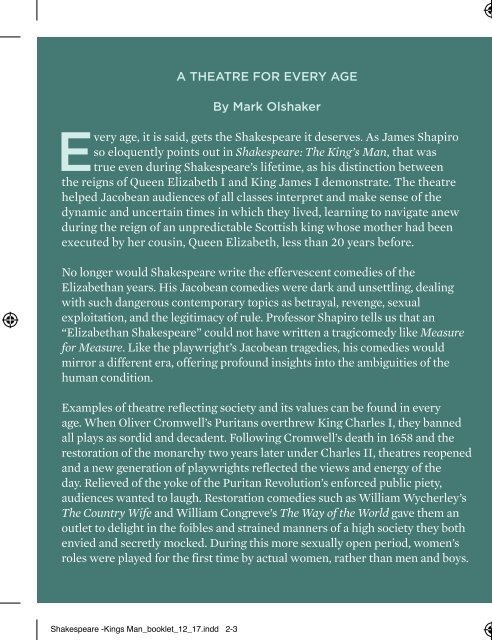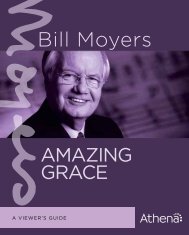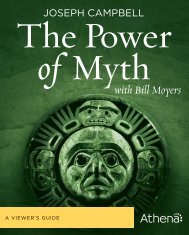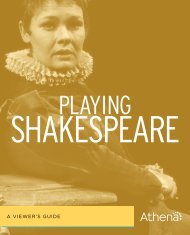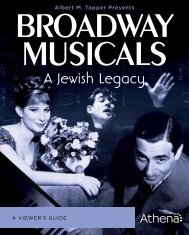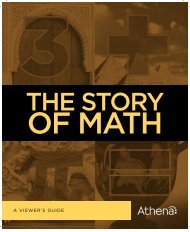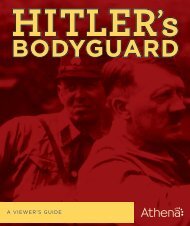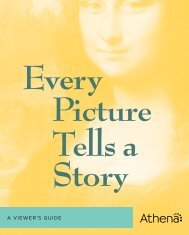Shakespeare - Athena
Shakespeare - Athena
Shakespeare - Athena
Create successful ePaper yourself
Turn your PDF publications into a flip-book with our unique Google optimized e-Paper software.
A THEATRE FOR EVERY AGE<br />
By Mark Olshaker<br />
Every age, it is said, gets the <strong>Shakespeare</strong> it deserves. As James Shapiro<br />
so eloquently points out in <strong>Shakespeare</strong>: The King’s Man, that was<br />
true even during <strong>Shakespeare</strong>’s lifetime, as his distinction between<br />
the reigns of Queen Elizabeth I and King James I demonstrate. The theatre<br />
helped Jacobean audiences of all classes interpret and make sense of the<br />
dynamic and uncertain times in which they lived, learning to navigate anew<br />
during the reign of an unpredictable Scottish king whose mother had been<br />
executed by her cousin, Queen Elizabeth, less than 20 years before.<br />
No longer would <strong>Shakespeare</strong> write the effervescent comedies of the<br />
Elizabethan years. His Jacobean comedies were dark and unsettling, dealing<br />
with such dangerous contemporary topics as betrayal, revenge, sexual<br />
exploitation, and the legitimacy of rule. Professor Shapiro tells us that an<br />
“Elizabethan <strong>Shakespeare</strong>” could not have written a tragicomedy like Measure<br />
for Measure. Like the playwright’s Jacobean tragedies, his comedies would<br />
mirror a different era, offering profound insights into the ambiguities of the<br />
human condition.<br />
Examples of theatre reflecting society and its values can be found in every<br />
age. When Oliver Cromwell’s Puritans overthrew King Charles I, they banned<br />
all plays as sordid and decadent. Following Cromwell’s death in 1658 and the<br />
restoration of the monarchy two years later under Charles II, theatres reopened<br />
and a new generation of playwrights reflected the views and energy of the<br />
day. Relieved of the yoke of the Puritan Revolution’s enforced public piety,<br />
audiences wanted to laugh. Restoration comedies such as William Wycherley’s<br />
The Country Wife and William Congreve’s The Way of the World gave them an<br />
outlet to delight in the foibles and strained manners of a high society they both<br />
envied and secretly mocked. During this more sexually open period, women’s<br />
roles were played for the first time by actual women, rather than men and boys.<br />
Subsequent decades saw the beginnings of a new type of feel-good theatre,<br />
but one that reflected a society preoccupied with making things “right” and<br />
proper. This impulse reached its preposterous nadir in 1681 with Nahum<br />
Tate’s rewriting of King Lear. Tate removed the Fool and his acerbic social<br />
commentary and substituted a new, upbeat conclusion to <strong>Shakespeare</strong>’s<br />
tragedy. In Tate’s version, Cordelia doesn’t die. Instead, she marries Edgar<br />
and they live happily ever after—a model of how audiences were expected<br />
to live their own lives.<br />
In the Victorian period, a newly industrialized and increasingly powerful<br />
Britain was displaying its prowess with stage spectacles, musical<br />
extravaganzas, and elaborate comic operas. As the 19th century progressed,<br />
Britain’s rather straight-laced society grew to favor domestic comedies and<br />
sentimental dramas with elements of realism, like Arthur Wing Pinero’s<br />
Trelawney of the “Wells.” Contrast this with the “angry young men” of<br />
London’s Royal Court Theatre in the late 1950s, where John Osborne’s Look<br />
Back in Anger stunned playgoers with its frank depiction of middle-class<br />
life and frustrations in the years following World War II.<br />
Nowhere, perhaps, does the relationship between theatre and society<br />
emerge more clearly than in comparing productions of the same<br />
<strong>Shakespeare</strong>an plays in two distinct eras. For a vivid demonstration, we can<br />
thank Laurence Olivier and Kenneth Branagh, each of whom committed<br />
memorable versions of Henry V and Hamlet to film.<br />
Olivier’s Henry V, produced during World War II as a morale booster,<br />
portrays a resolute and determined king, rallying the population in a<br />
righteous cause against a formidable enemy. The beautiful film attempts<br />
something midway between stage and screen. It begins with a staging in<br />
<strong>Shakespeare</strong>’s Globe, but when Henry’s army reaches France, the movie<br />
transports us to a semi-realistic, semi-storybook setting.<br />
Branagh’s 1989 film is a Thatcher-era, post-Falklands War meditation on<br />
1<br />
<strong>Shakespeare</strong> -Kings Man_booklet_12_17.indd 2-3<br />
12/17/12 5:27 PM


